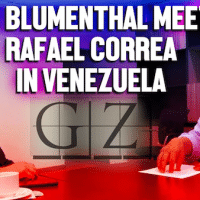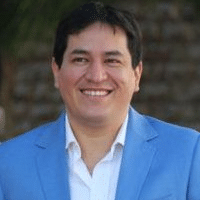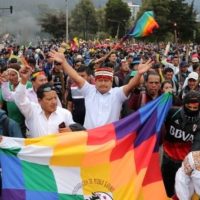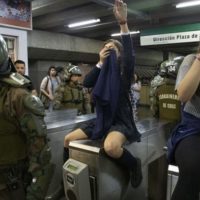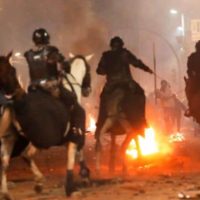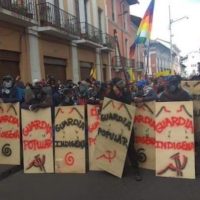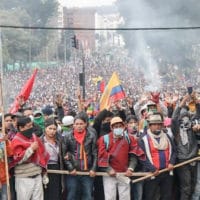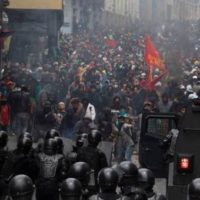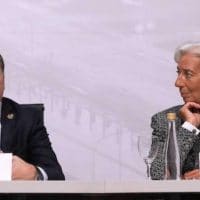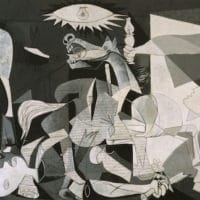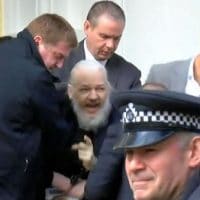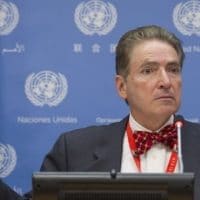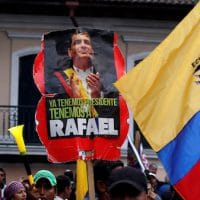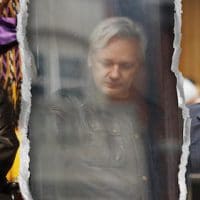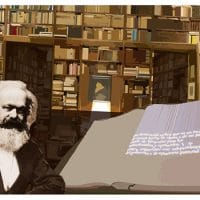-
Rafael Correa on Venezuela, Assange, and ‘preventing the total destruction of our homeland’
Max Blumenthal interviews former Ecuador President Rafael Correa, who was in Venezuela to observe its legislative elections and show support to a government under sustained economic and political attack by the U.S.
-
How Ecuador’s Democracy is being suffocated
Those polled said that Arauz was by far the most attractive candidate. But, if the ruling bloc in Ecuador has its way, Arauz will not be sworn in as the next president of the country next year. They will use every means to suffocate democracy in their country.
-
Democracy: when the opposition is the Media
One more court case has been opened against the former Ecuadorian president, Rafael Correa. The elite with the help of the corporate media are trying to get him behind bars. Also, a council has been created, by the executive, to control the judiciary, proving that there is no impartial process for the victims of lawfare.
-
Indigenous organizations propose a People’s Parliament
They seek to develop an economic model to prevent the application of IMF policies against the Ecuadoreans.
-
There’s something that’s ours on those streets and we’re going to take it back
In Lebanon, it was a tax on the use of WhatsApp; in Chile, it was the rise in subway fares; in Ecuador and in Haiti, it was the cut in fuel subsidies. Each of these conjunctures brought people to the streets and then, as these people flooded the streets, more and more joined them.
-
Whitewashing neoliberal repression in Chile and Ecuador
If the first casualty of war is truth, its self-anointed purveyors in the international media have much blood on their hands indeed.
-
The IMF does not fight financial fires but douses them with gasoline
On 13 October, Moreno had to promise to withdraw Decree 833. Pressure from the streets, from the United Nations, and from the Ecuadorian Episcopal Conference forced him to the table, where a televised discussion was held. The indigenous leaders won the ‘debate’–they were much more prepared and far more humane than the president and his clumsy ministers.
-
Defying repression, tens of thousands of Ecuadorians take part in national strike
The heavy-handed response of the Ecuadorian police and military to the massive mobilizations in the country has already cost eight lives with hundreds suffering grave injuries
-
State of exception in Ecuador amid strong protests
President Lenin Moreno declared a national state of exception due to protests against the elimination of fuel subsidies and expressed he´s not taking a step-back on reestablishing it because it´s “a distortion that caused deterioration to the national economy.”
-
The IMF’s latest victims
In 2013, the International Monetary Fund produced a report acknowledging that it had “underestimated” the effects that austerity would have on Greece’s economy. Yet the Fund has made the same mistakes in its subsequent deals with Argentina and Ecuador.
-
Tech privacy pioneer Ola Bini released after 70 days of extrajudicial detention in Ecuador
After 70 days in preventive detention without formal charges, Ola Bini’s request for habeas corpus was granted, and shortly after, he was released from prison.
-
My friend is in a prison in Ecuador
This article was first published on June 10, 2019 in the Daily Hampshire Gazette. Two months ago, the police in Ecuador arrested my friend Ola Bini at Quito airport. Ola was on his way to Japan for a two-week martial arts course. He’s a software developer from Sweden who has lived in Ecuador since 2013. […]
-
Julian Assange outside the Gate of Hell
I’ve been to see Julian Assange at the Ecuadorian Embassy several times, mainly when Rafael Correa was President and the Embassy felt like a liberated space. A few weeks ago I met him again. By now Correa’s successor, Lenín Moreno, had capitulated on every level to the American Empire.
-
Report of the Independent Expert on the promotion of a democratic and equitable international order
The Secretariat has the honour to transmit to the Human Rights Council the report of the Independent Expert on the promotion of a democratic and equitable international order, Alfred de Zayas, on his mission to the Bolivarian Republic of Venezuela and Ecuador, pursuant to Council resolution 36/4.
-
In a repeat of Brazil model, judge orders detention of Rafael Correa
The former president of Ecuador is accused of being involved in the failed kidnapping of a coup plotter based on mails between officials.
-
Ecuador, Assange and the empire: anatomy of a liberal sellout
Under Ecuador’s new government, the gagging of Assange has long been a matter of when, not if. It’s only the latest sign of a once-defiant nation’s newfound subservience to Washington and Europe.
-
Understanding the native roots of the constitutions of Bolivia and Ecuador
Good Living is a philosophy promoted by Andean governments of South America, pioneered by Evo Morales (Bolivia) and Rafael Correa (Ecuador). It goes back to the roots of ancestral cultures of the region and posits a model for human life in harmony with nature.
-
Reading Marx’s Capital Today: Lessons from Latin America
One hundred and fifty years ago, Karl Marx published his book Capital, an intellectual effort of great breadth, with the aim of revealing the logic of capitalist production and providing workers with theoretical instruments for their liberation. Having discovered the logic of the system, he was able to foresee with great anticipation much of what is happening in the world capitalist economy today. But, we cannot mechanically apply what is outlined in Capital to the current reality of Latin America.
-
Ecuador Expresses Its Concern about Libya and Human Rights
Regarding the recent events in Libya, Rafael Quintero, Undersecretary for Asia, Africa, and Oceania, reiterated Ecuador’s disagreement with disrespect for the territorial integrity of that country. He expressed Ecuador’s insistence that international conventions be complied with, that human rights in Libya be respected, and that no attempt be made to take the Libyan case as […]
-
Ecuador Condemns US Sanctions against PDVSA
The Ministry of External Relations, Commerce, and Integration of Ecuador regards the United States Government’s decision to impose unilateral sanctions against the Venezuelan state enterprise PDVSA — as well as others — as an action contrary to the sovereign right of a country to maintain commercial relations with any country in the world. In the […]

